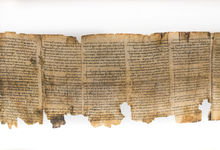Ministry (7): the gift as a duty?
Change has its tradition—even in the ministerial order of the New Apostolic Church. But how far is this allowed to go? For example, aren’t pastors and Evangelists a biblical must? Following are some answers to some frequently asked questions.

It all revolves around Ephesians 4: 11: “And He himself gave some to be Apostles, some prophets, some Evangelists, and some pastors and teachers.”
It was on the basis of this passage that the Catholic Apostolic Church developed its “Doctrine of Fourfold Ministry”. Accordingly, the internal order of the church of Christ required Apostles, Prophets, Evangelists, and Pastors—who were combined with teachers. This was also the ministerial understanding that the New Apostolic Church followed at first.
This concept also has its precursor: the Reformer John Calvin had already formulated the Doctrine of Fourfold Ministry 300 years before. His church ordinance of 1541 stipulated that each congregation required the ministries of Pastor, Doctor (teacher), Elder, and Deacon. In doing so, he made use of designations that were already generally recognised as biblically founded ministries.
Examples from yesterday for tomorrow
Both apostolic churches primarily found biblical foundations for their view of the Fourfold Ministry in the form of comparisons—for example, with the four rivers of the Garden of Eden, with the four horns on the sacrificial altar of the tabernacle, with the four living creatures of Revelation 4, and many other similar elements.
In Catholic Apostolic literature this was described as “foreshadowing”. Scholars today refer to this as “typological interpretation”, in which images from the past serve as keys to understanding both the present and future. Although this principle has a tradition dating back to the early Christians, it is considered entirely unsuitable as a response to purely factual questions, for example: what ministries did the early church have?
No ordinations, no requirements
A closer look into the New Testament shows that there are important differences between Deacons and Elders/Bishops, on the one hand, and prophets, Evangelists, and pastors, on the other hand:
- both the book of Acts and the letters of Paul relate how the Apostles first chose Deacons, and later ordained Bishops. Nothing comparable can be found with respect to prophets, Evangelists, or pastors.
- the Pastoral Letters (First and Second Timothy, Titus) mention clear requirements of the men who are to serve as Deacons or Bishops. No such references exist with respect to prophets, Evangelists, or pastors.
- the two groups of designations are never evaluated together in any passage. The only commonality between them is the mention of the Apostle.
When seen in the overall context of the New Testament, Ephesians 4: 11 cannot be considered a suitable basis for regarding prophets, Evangelists, and pastors as a mandatory component of the church’s ministerial order.
Between duty and gift
So what are prophets, Evangelists, and pastors doing in this passage? The answer lies in the literal translation of the tiny word “gave” (Greek didómi), which can also mean “bestowed”. Ephesians 4: 7 already points in this direction: “But to each one of us grace was given according to the measure of Christ’s gift.”
And this becomes very clear in 1 Corinthians 12, which mentions the various different services and duties (diakonía) and the various gifts of grace (chárisma). Along with prophets and teachers, this passage also lists “workers of miracles”, “helps”, and “administrations”, just as the New Apostolic history book “Alte und neue Wege” [Old and new ways] already emphasised in 1913. Accordingly, there would actually have to be more than “only four or five ministries”, but “many”.
Ministry on the one hand, and spiritual gift on the other—that also explains why Philip, known to be one of the first seven Deacons, is also described as an Evangelist. The same holds true for Timothy, who was given the spirit of power, love, and of a sound mind through laying on of hands. It likewise explains why Apostle Paul was also able to describe himself as a teacher.
Not every gift corresponds to a ministry, but not every service or duty requires a ministry. This will be the focus of the next issue in this series.
Photo: Jakub Krechowicz - stock.adobe.com
Article info
Author:
Date:
Keywords:
Andreas Rother
05.09.2019
ministry,
Deacon,
Evangelist,
Shepherd,
Bishops,
prophet,
Doctrinal statements



















